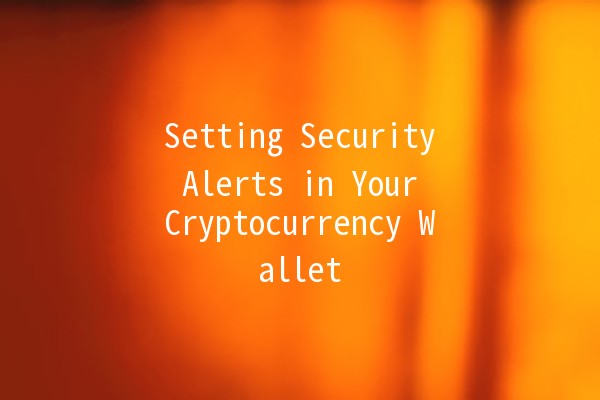
With the increasing popularity of cryptocurrencies, ensuring the safety of your digital assets has become paramount. One effective method to enhance security is by setting up alerts in your cryptocurrency wallet. Alerts can notify you about suspicious activities, changes in wallet balances, or even unauthorized access attempts, allowing you to take action before it’s too late. In this article, we’ll explore the importance of security alerts, techniques to enhance productivity when managing your wallet, and practical applications to ensure your cryptocurrency remains secure.
The Importance of Security Alerts

Security alerts act as a safety net for cryptocurrency holders, providing timely notifications regarding various crucial events. Here are some reasons why setting security alerts is vital:
Five Techniques to Boost Productivity While Managing Your Cryptocurrency Wallet
Managing a cryptocurrency wallet can often become overwhelming with the plethora of tasks involved. Here are five techniques to help you boost productivity and keep your wallet secure:
Overview: A password manager helps generate, store, and autofill strong passwords, ensuring that your wallets are protected against unauthorized access.
Application Example: Tools like LastPass or 1Password can be used to store wallet passwords and seed phrases securely. This way, you’ll only need to remember one master password while having all your critical credentials secured.
Overview: Twofactor authentication provides an additional layer of security, requiring not only your password but also a second piece of information.
Application Example: Most cryptocurrency wallets support 2FA via apps like Google Authenticator or Authy. By enabling 2FA, you ensure that even if someone steals your password, they cannot access your wallet without the second factor.
Overview: Keeping your wallet software up to date is crucial for security. Software updates often include patches for vulnerabilities that hackers might exploit.
Application Example: Set a reminder to check for updates weekly. This ensures your wallet is running on the latest software, protecting it against newly discovered threats.
Overview: Custom alerts can be tailored to notify you about specific actions, such as sending or receiving a certain amount of cryptocurrency.
Application Example: If your wallet supports it, access the settings to configure alerts. For instance, you might set an alert for any transactions over a certain threshold, helping you monitor large transfers closely.
Overview: Backups of your wallet data ensure that you can recover your assets in case your device is lost or compromised.
Application Example: Regularly export your wallet data or seed phrase and store it securely, possibly in a different location from your main device. Using hardware wallets, like Ledger or Trezor, can also help protect your private keys from online threats.
Common Concerns and Their Solutions
You can monitor your account for unauthorized transactions or unusual login attempts. Additionally, implementing alerts for any login from a new device or for changes to your account settings is essential. Continually check your transaction history, and ensure that any alerts you set notify you immediately of suspicious activity.
If you receive an unexpected alert, act immediately. Change your wallet password, enable 2FA if not already active, and check your transaction history for any unauthorized activities. Contact customer support for your wallet service to ensure any suspicious activity is investigated promptly.
Many wallets allow you to set price alerts for cryptocurrency values. You can do this through your wallet settings or linked exchange app if supported. Price alerts help you make timely trading decisions, although they do not directly relate to security.
It’s advisable to review your security settings at least once a month. This allows you to implement any recommended changes, update passwords, and ensure your 2FA is functioning correctly.
If your current wallet does not support security alerts, consider switching to a more robust option. Many modern wallets offer comprehensive alert systems and additional security features.
Using public WiFi can expose your wallet to security risks. Avoid accessing your wallet or making transactions over unsecured networks. Instead, use a Virtual Private Network (VPN) to secure your connection if you must access it over public WiFi.
By implementing these techniques and staying informed about potential security threats, you can greatly enhance your cryptocurrency wallet's safety. Setting up alerts is just one of many steps necessary to protect your valuable digital assets, but its significance cannot be overstated. As the world of cryptocurrency continues to evolve, so too must your approach to security. Emphasizing proactive monitoring and staying accountable for your wallet management will lead to a safer investing experience in the everchanging landscape of digital currencies.

